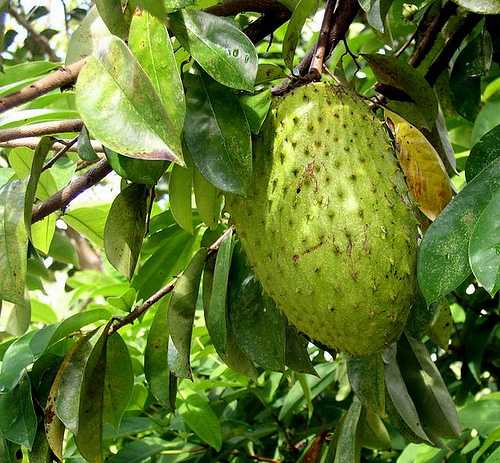You may not have heard of the fruit, guyabano or the guyabano health benefits, unless you're from the Philippines. However, you might recognize it by another name, as graviola, soursop, guanabana, mundla, ramfar and thurian-khaek.
It grows only in areas where the temperature remains above 37 degrees. At that point, the plant dies from the cold. The guyabano fruit is from the Annona muricata tree and grows in many warm regions. Many describe the taste as tart. This explains the Dutch derivation of the name, soursop, meaning sour sack.
It grows only in areas where the temperature remains above 37 degrees. At that point, the plant dies from the cold. The guyabano fruit is from the Annona muricata tree and grows in many warm regions. Many describe the taste as tart. This explains the Dutch derivation of the name, soursop, meaning sour sack.
Depending on the variety of the fruit, the flavor varies. Some describe it as sour version of a combination of strawberry and pineapple. Others note it also has a creamy undertone that adds a hint of coconut or banana to the flavor. Many locals use the fruit to make salads, ice cream, puddings and cakes. The guyabano benefits don't stop at an unusual addition to a salad or an ice cream flavor. This plant comes loaded with dynamic healing benefits and immune system boosters.
Health Benefits
Several studies report interesting results using parts of the tree as medicine. Many of the studies isolated annonaceous acetogenins from the leaves, bark, fruit seeds and twigs of the guanabana tree. They found this substance beneficial in many situations from fighting parasites to acting as cancer killer for cancer cells resistant to many of the other drugs.
Damages Cancer Cells
Several different research groups studied the compound annonaceous acetogenins and found the phytochemicals in the plant offer selective toxicity against lung, human breast solid tumor, prostrate, pancreatic, colon, liver and lymphoma cancer cells. Selective toxicity simply means it only damages the cancer cells without harming the healthy cells. However, there is no cancer research on the guyabano benefits from eating the fruit.
Purdue University leads many of the studies showing the graviola benefits from the acetogenins. They began their research and published in 1997. Since then, they've performed a number of different studies on the acetogenins in the plant. One of particular interest noted that cancer cells that developed a resistance to many of the chemotherapy drugs succumbed to the toxic reaction of the acetogenins. However, it didn't harm any of the surrounding healthy cells.
Comparing the Effects of Chemotherapy and Guyabano Acetogenins in Mice
A Japanese study also used acetogenins from the soursop to study the effect on Lewis lung carcinoma cancer cells inoculated in mice. One third of the mice were a control group that received no treatment. The second third received the chemotherapy drug Adriamycin and the final group the soursop acetogenins. While only five of the six untreated mice remained alive the tumors grew as normal. Both the chemo treated and the guyabano treated mice showed a reduction in the size of their tumors by over 50 percent, with the guyabano group showing the most. However, three of the six taking the chemotherapy medication died from toxicity of the drug.
Other Health BenefitsGuyabano benefits do include fighting cancer, but since the cancer fighters are only in the seeds, bark, leaves and stems, you won't get the benefit from consuming the fruit. One option is to drink soursop leaf tea, although the administration of the cancer fighting substance is unknown and the digestive process may interfere. One word of warning on the use of the acetogenin containing parts of the guyabano is the potential to create Parkinson's type of tremors. Consumed in large amounts, the seeds cause vomiting, also.
However, adding soursop to your diet provides other guyabano health benefits. The fruit contains high amounts of vitamin C and B vitamins as well as potassium and magnesium. The citizens of the Philippines use it to help improve the liver, reduce fevers and aid those with breathing disorders. The high fiber content of the guanabana fruit is one more of the heart healthy guyabano benefits.





















0 comments:
Post a Comment